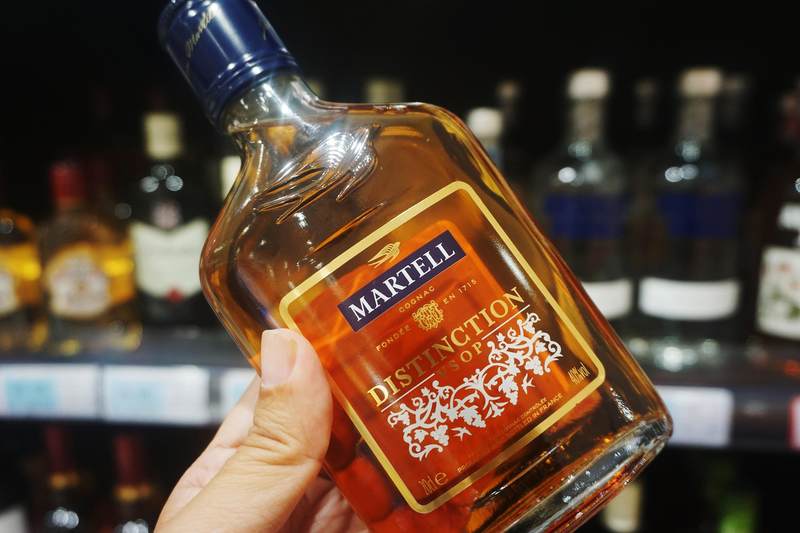Domestic imports of French cognac will face possible price fluctuations.
Brandy tariff increased to 10%! Dealers bluntly said that costs have increased by more than 6.5%, and the French Cognac market has encountered a cold winter in China

Blue Whale News, February 14 (Reporter Zhu Xinyue)According to the latest tariff adjustment plan, starting from January 1, 2025, the import tariff on brandy (covering French cognac) will be significantly increased from the original provisional tax rate of 5% to the MFN rate of 10%. This change has undoubtedly brought unprecedented challenges to dealers importing French cognac.
challenges have exacerbated
A spirits dealer admitted in an interview with Blue Whale News that the increase in tariffs from a preferential tax rate of 5% to 10%, directly led to an increase in their costs by at least 6.5%.
He explained in detail: Taking a value of 2 million yuan as an example, the original freight cost was 100,000 yuan.“ After the tariff was raised to 10%, the tariff fee reached 210,000 yuan. In this way, the cost of tariffs and freight alone has climbed to 2.31 million yuan. In addition, we also need to pay a 20% consumption tax, or 577,500 yuan, and other import tax rates, totaling 787,500 yuan. Combining these factors, our costs actually increased by 6.56%, which is an increase that cannot be ignored.& rdquo; In the current environment where the market is already weak, this is undoubtedly another blow to dealers, and it can be said to be worse.
The reason why the current market environment is described as not optimistic is that as early as October 11, 2024, the country has begun to use the form of margin to implement temporary anti-dumping measures on imported brandies originating in the EU. The margin ratio required by each company is as high as 30.6%-39.0%.
Faced with this anti-dumping measure, some dealers said at that time that in order to cope with possible shocks, they had made a large amount of stock in advance. Therefore, when the first wave of impact arrived, although the intensity was not small, they did not immediately pass on the pressure of rising costs to consumers due to sufficient stocks. However, with further increases in tariffs, dealers are facing increasing operating pressure.
Some dealers revealed that at the end of last year, the customs had stopped the customs declaration of cognac (European brandy), and all duty-free shops had been removed from the online shelves. If the customs had been cleared, there would be no supply of cognac after sales. Currently, tax-paying dealers still have a large inventory of cognac, and it is estimated that there will be still a year’s supply.
This means that one year later, domestic imports of French cognac will face possible price fluctuations, and the direction of the market will become particularly critical. Dealers need to find a balance between inventory management and market forecasting to ensure that their business can continue to develop steadily.
sales pressure
From the performance data of spirits groups, we can also see that French cognac is facing unprecedented pressure in the China market. According to LVMH’s 2024 results report, its wine and spirits business’s overall revenue was 5.862 billion euros (approximately RMB 44.3 billion), a year-on-year decrease of 11%, and an organic decline of 8%, while operating profit was 1.356 billion euros (approximately RMB 10.2 billion), compared with the previous year’s 2.109 billion euros, a sharp drop of 36% year-on-year. In fact, the operating profit margin of the liquor sector has dropped from 31.9% in 2023 to 23.1% in 2024.
LVMH said that the revenue of its well-known cognac brand Hennessy has been dragged down by weak local demand in China and the challenges of the U.S. market environment.
Similarly, Pernod Ricard’s earnings report revealed a similar dilemma. Pernod Ricard’s financial report for the first half of the 2024/2025 fiscal year (July 12, 2024) showed that due to the impact of tourism retail in China and the world, Martell’s sales dropped significantly, accounting for about 90% of the total sales decline of Pernod Ricard Group.
In addition, Remy Martin disclosed that in the Asia-Pacific region, sales of cognac in the China market have dropped significantly. Despite the strong performance of the Group’s direct sales channels, the cautious attitude of distributors led to a slowdown in indirect sales.
Remy Ma Jundu pointed out in his financial report that he has noticed that China’s Ministry of Commerce has decided to impose a temporary additional tariff of 38.1% on imported cognac starting from October 11, 2024. If these temporary tariffs are confirmed, the impact on fiscal year 2024 – 2025 will be limited, and the group will take measures to mitigate their impact starting from fiscal year 2025 – 2026.
According to data from the French National Cognac Industry Office, the global exports of French cognac manufacturers have dropped by 10.6% compared with 2023. This decline was mainly due to the China market.
These data have undoubtedly cast a thick shadow on the future development prospects of French cognac in the China market. At present, China’s Ministry of Commerce has announced that it will extend the anti-dumping investigation period to April 5, 2025. This is undoubtedly an unprecedented crisis for EU brandy brands.



